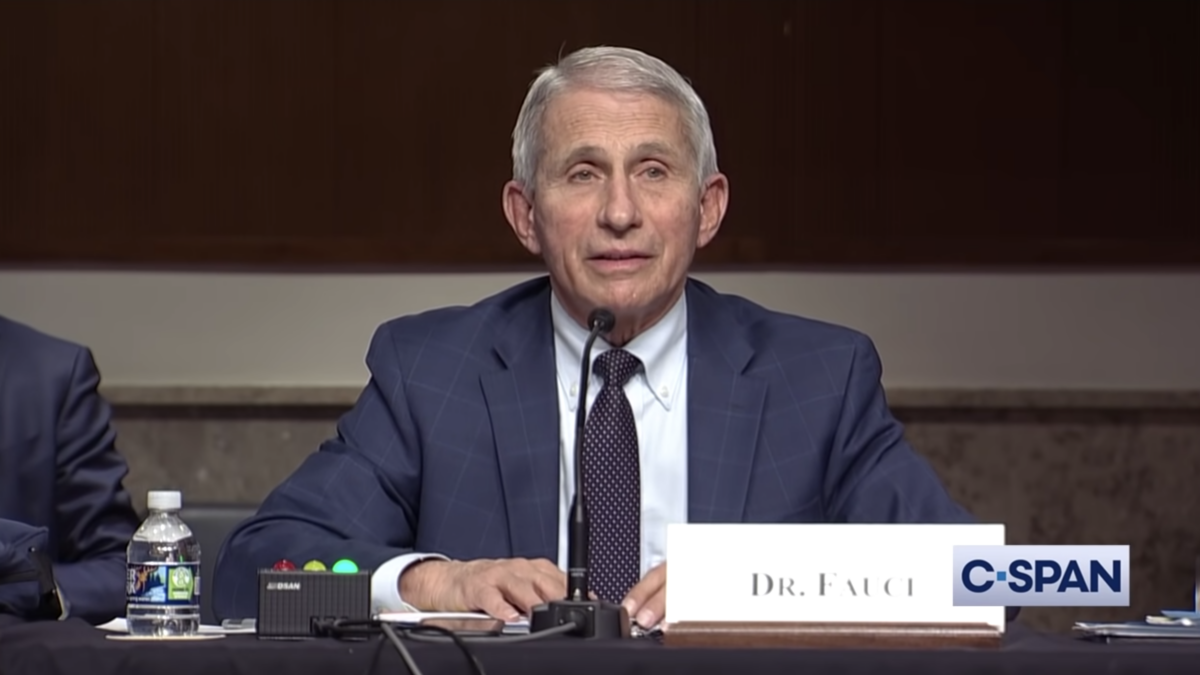Dr. Anthony Fauci announced that in December he will step down as head of the National Institute of Allergies and Infectious Diseases (NIAID) and as Biden’s chief medical adviser, ending a 54-year career as a bureaucrat and collecting what is reportedly the largest federal pension in history.
He will depart so-called public service, conveniently, right before Republicans have a chance to pick up a majority in at least one chamber of Congress, and with it, the oversight gavel. While Fauci calls “nonsense” any speculation that his retirement is timed to avoid future congressional investigations, it very likely played a role in his thinking, or at least in that of those around him.
Fauci’s appearances in front of Congress have become infamous for their dripping condescension, seething arrogance, hostile indignation, and self-righteous obfuscation. Fauci’s exchanges with Sen. Rand Paul, R-Ky., are now must-see television for the number of times Fauci loses his temper at the mere thought of having to explain his decision-making to the people who pay his salary.
After an exchange with Sen. Roger Marshall, R-Kan., Fauci was heard to mutter “what a moron” in reference to a man who was actually elected to implement policy, unlike Fauci. When asked about it later, Fauci dismissed congressional questioning of his decisions as “anti-science” because “I represent the science.” Right.
So if you’re Tony Fauci, someone who seems very concerned with his personal brand (he recently opined on “the Fauci effect,” referring to himself in the third person to describe inspiring a national wave of medical school applications), then more appearances before Congress might be considered bad for business. This is especially true now that Paul, Fauci’s most pointed interlocutor, is poised to take over a committee chairmanship.
A New Precedent for Oversight
It used to be that stepping down from government service removed you from the congressional oversight ring. But the many, many precedents set recently by Democrats should ensure that Fauci will still be around to answer questions from an incoming Republican majority. Republicans need only to use the same playbook that Democrats would if Fauci were a Republican.
As the Jan. 6 Select Committee has shown, it is now apparently appropriate for Congress to demand and receive the contents of text messages from U.S. citizens and fellow members of Congress. Surely it is now also fine to demand the private communications of a government bureaucrat, especially those who, like Fauci, work so closely with Big Pharma.
Then there are Fauci’s financial dealings. For decades, Fauci has controlled billions in government funding in the research space, getting to decide which technologies and research fields survive or die. Did he receive royalties? Did he make conveniently timed investments? Was he compensated for the glowing documentary hastily thrown together by National Geographic? Did he receive payment for the InStyle photoshoot he sat for while mandating that grandparents die alone in nursing homes and families be unable to gather for their funerals? Has he in any way licensed his image to appear on prayer candles, Christmas ornaments, or throw pillows? Does he plan to?
Then there is the ongoing rabbit hole related to Fauci-led funding of the Wuhan lab, where the Covid-19 virus is now widely believed to have originated. Should Fauci continue to sneer at congressional questions and deny his role in a cover-up, Congress can subpoena him. And his documents. And anyone who worked for him. And anyone who may have been involved in approving grants for gain-of-function research, including the grantees themselves.
If Fauci still chooses not to comply, no matter. Democrats have set the bar pretty low for sending criminal contempt referrals to the Department of Justice. So hold Fauci in contempt! Attorney General Merrick Garland will ignore the referral like the good partisan foot soldier he is, so Republicans will have to wait for a Republican-led DOJ to launch an investigation and raid Fauci’s house, as they recently did to former Trump official Jeffrey Clark. (Just make sure CNN cameras are alerted first.)
And if Democrats don’t like it? Well, there’s precedent to deal with that, too. Republicans can just kick Democrats off their committees in the same manner that they removed Rep. Paul Gosar, R-Ariz., and Rep. Marjorie Taylor Greene, R-Ga. Or, if things get heated, they can simply prevent Democrats from serving on committees at all, as current House Speaker Nancy Pelosi did to Rep. Jim Banks, R-Ind., and Rep. Jim Jordan’s, R-Ohio, appointments to the Jan. 6 Select Committee. And this, of course, is after Republicans have received any and all texts, calls, and voicemails their Democratic colleagues sent to Fauci. Because, yes, there’s precedent for that, too.
In his resignation letter, the 82-year-old Fauci said he was stepping down to “pursue the next phase” of his career. That next phase should be perpetually in front of Congress. Why should he mind? After all, the man does love the spotlight.









